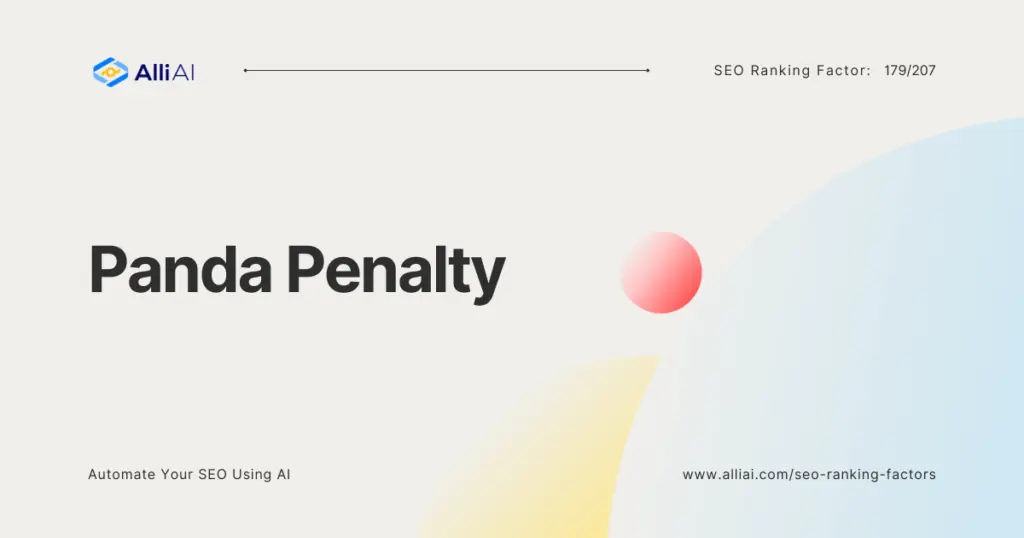What is Panda Penalty?
Panda Penalty refers to a significant drop in website ranking on Google as a result of Google’s Panda algorithm update. This algorithm was first released in February 2011 and has had several updates since. It is designed to reduce the prevalence of low-quality, thin content in search results and to reward unique, high-quality content.
A real-life analogy for the Panda Penalty would be a health inspection in a restaurant. Imagine Google as the health inspector and websites as restaurants. Just as a restaurant must meet certain health standards to be deemed safe for customers, a website must meet certain quality standards to be deemed worthy of a top spot in search results. When a restaurant fails a health inspection, it faces penalties such as fines or closure, just as a website faces penalties in the form of lower rankings when it fails to meet Google’s quality guidelines.
Why is Panda Penalty important in SEO?
Panda Penalty is critically important in SEO because it directly influences a website’s visibility on Google. In the competitive landscape of digital content, appearing on the first page of search results can be the difference between a thriving online presence and obscurity. High visibility leads to increased traffic, conversions, and ultimately, revenue. Since the Panda algorithm targets the quality of content, it forces websites to prioritize creating valuable, in-depth, and unique content for their audience. Ignoring the implications of the Panda Penalty can result in significant drops in search rankings, making it harder for potential customers to find your site.
How Panda Penalty affects SEO?
The impact of the Panda Penalty on SEO is profound. Websites that suffer from this penalty see a drastic decline in their search visibility, which often leads to a decrease in traffic, engagement, and conversion rates. To understand the severity, consider these relevant statistics:
1. According to Moz, an authority on SEO, Panda updates have affected up to 12% of search results, significantly reshaping the rankings of nearly one in eight search listings.
2. SEMrush, another leading SEO tool, has reported that websites penalized by Panda can experience traffic losses of up to 50% or more.
These statistics underscore the importance of adhering to Google’s content quality guidelines to avoid being penalized. The link to Google’s own guidelines provides a comprehensive overview of what is expected from webmasters ([Google’s Quality Guidelines](https://developers.google.com/search/docs/essentials/quality-guidelines)).
FAQ
What types of content are targeted by Google Panda?
Google’s Panda algorithm is known to target “thin” content, which includes pages with little or no added value, such as duplicate content, plagiarized content, low-quality affiliate pages, and content stuffed with keywords without regard for user experience.
How can I recover from a Panda Penalty?
Recovering from a Panda Penalty involves auditing your website for low-quality content and making significant improvements. This includes removing or rewriting thin content, improving user engagement, enhancing the overall user experience, and ensuring your website is aligned with Google’s Webmaster Guidelines.
Does Panda still affect websites today?
Yes, while the Panda algorithm is now integrated into Google’s core ranking algorithm, it continues to impact websites that do not meet Google’s quality standards. Continuous monitoring and improvement of website content are essential to avoid or recover from the effects of the Panda Penalty.
Conclusion
The Panda Penalty remains a crucial aspect of SEO strategy, emphasizing the importance of high-quality content in achieving and maintaining good search engine rankings. By understanding what Panda targets and implementing strategies to improve content quality, websites can avoid penalties and even recover from them. As the digital landscape evolves, the core message of the Panda update remains relevant: Valuable, high-quality content is key to SEO success. Keeping this in mind, webmasters should focus on creating exceptional content that serves their audience’s needs and adheres to Google’s guidelines, ensuring their websites thrive in the competitive online space.






